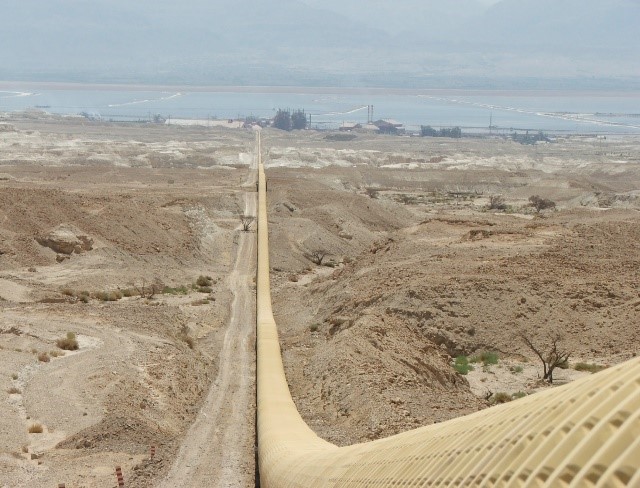Logistics & Distribution
ICL benefits from the proximity of its facilities to developed economies as well as to emerging markets.
Distribution Network
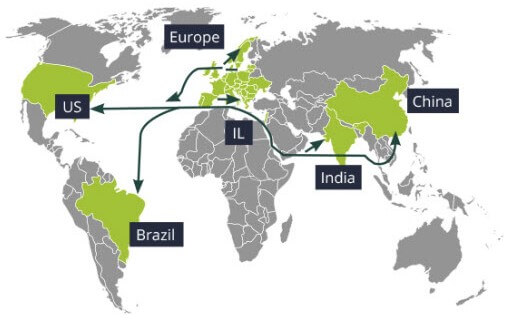
Israel
Most of ICL’s products in Israel, whether in solid or liquid state, are transported from the company’s southern sites by rail to the Ashdod and Haifa ports or by trucks to the Eilat port. The port of Eilat is located in the far south of Israel on the Red Sea coast, approximately 180 kilometers south of Rotem and 200 kilometers south of Sdom. Shipments exiting the Eilat port are to the Far East, whereas sales to Europe and North and South America are transported from the Ashdod port.
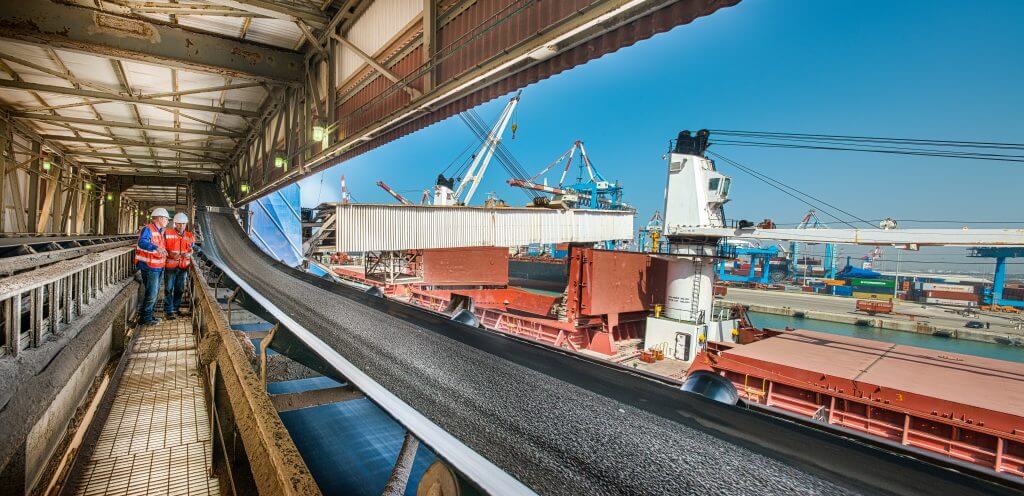
Potash from ICL Dead Sea is transported by a conveyor belt from the Sdom site to a railhead located at Tzefa in Mishor Rotem, and from there the output is transported by rail to Ashdod port.
A major part of the mentioned truck transport of ICL products in Israel is handled by ICL’s wholly owned subsidiary, ICL Tovala, which operates rigid freight trucks and trailers.
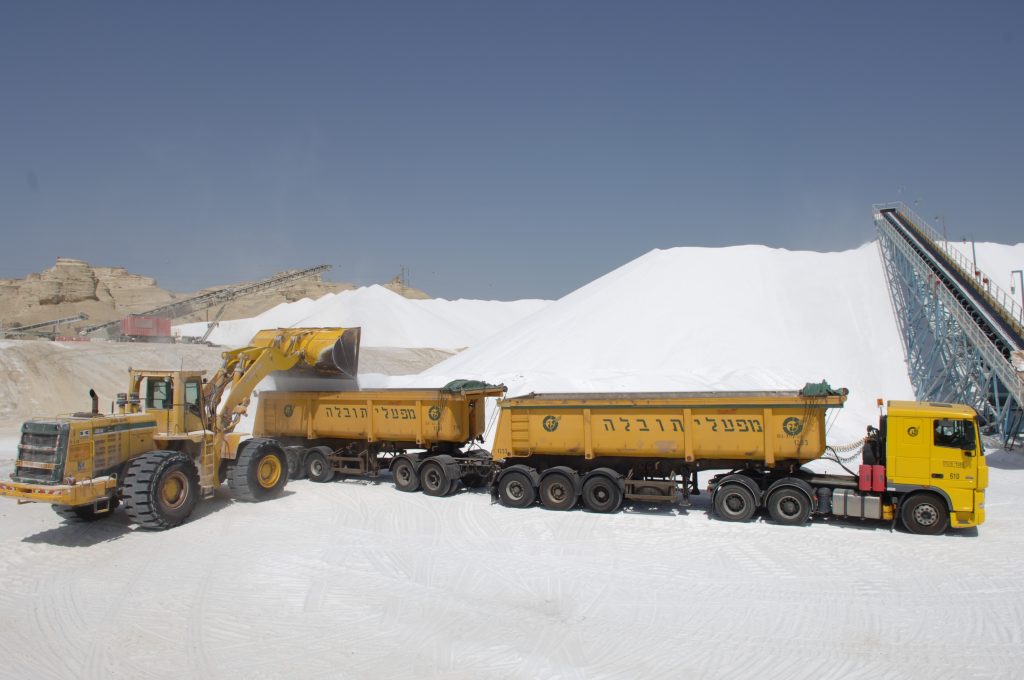
Efficient and Safe Road Transportation
Safety is a core value for ICL, including in logistics and transportation.
ICL uses multiple modes of transportation to transport its products and employees. As a result, transport by road is one of the issues on which ICL focuses its attention.
ICL trains its employees to drive safely, including unique simulator training as part of the Company’s annual Global Safety Week activities.
In Israel, ICL maintains driver safety rules that prohibit employees who receive repeated warning tickets from driving company vehicles.
ICL also promotes efficiency in road transport. During 2020, ICL Israel plans to transition some of its leased vehicle fleet to hybrid or electric cars. An in-depth analysis is planned to measure fuel consumption. ICL has also initiated a carpool pilot program that will give additional benefits to employees who ride together to work.
ICL is also reviewing its logistics fleet to increase its efficiency and minimize air pollution. The fleet is transitioning to advanced Euro 6 trucks, which use urea additives to reduce their emissions.
Spain
ICL Iberia transports the minerals it mines to production plants. Ore is taken by 25-ton road haulage trucks from the Cabanasses mine to the Suria plant and, through a conveyor belt, from the Vilafruns mine to the plants in Sallent. Final products, including potash and various salts, are transported directly to customers by truck or through a designated railway line from the mines to the port of Barcelona.
A truck fleet with towing equipment is used to transport salt from the mine. Up to 120 trucks of salt per day are dispatched from the mine to the port.
ICL Iberia owns and maintains approximately 1.5 kilometers and 3 kilometers of standard gauge railway at its Suria and Sallent plants, respectively. These rail lines connect to the regional rail network. Up to three trains depart daily, with a total payload capacity of 800 tonnes, distributed over approximately 21 freight cars. In 2019, ICL Iberia signed a new freight rail transport agreement with FGC (Ferrocarrils Generalitat de Catalunya), which is expected to improve the capacity of its rail transport. Over the next several years, the rail network is expected to expand to 24 freight cars carrying 1,000 tonnes and up to seven trains a day. The rail route for transport of potash, from Suria and Sallent to the terminal at the port of Barcelona, is about 80 kilometers.
Most of the shipments of ICL Iberia are made through a terminal it owns at the port of Barcelona (Trafico de Mercancias – Tramer), including storage facilities and freight-car and rail truck conveyor unloading facilities. The Company is in the process of establishing a new deep-water terminal in the Barcelona port. Read more here.
ICL Iberia and Ferrocarrils de la Generalitat sign an agreement to increase the number of freight trains between Bages and the Port of Barcelona
ICL Iberia and Ferrocarrils de la Generalitat de Catalunya (FGC – The Catalan Railways Authority) signed, in 2019, a new agreement to increase the number of trains transporting potash and salt from the Bages mines to the Port of Barcelona. The agreement is valid for 30 years and will double the amount of ore that the company transports to the port by train, reaching about two million tons each year. It includes increasing the number of trains, from the 3 daily trains with 21 wagons that currently run 5 days a week, to 4 daily trains of 21 wagons running 7 days a week.
This new train frequency will be launched as soon as the new terminal that ICL is building in the port of Barcelona is inaugurated. This new terminal and the related logistics that are being established in Súria, will make the loading and unloading of the material more efficient both at source and destination. It is expected that in 2021, the transport will go up to 4 daily trains of 24 wagons and gradually increase until it reaches 7 daily trains of 24 wagons each, making the activity even more efficient and sustainable.
The increase in rail transport, along with the launch of the ramp, are further evidence of ICL and FGC’s global commitment to the environment and the decarbonization of transport. And in this case, a key and strategic component such as logistics is integrated, as part of the improvement in sustainability. This agreement, by the increase in the number of freight convoys to the Port, entails an initial reduction of about 86,000 vehicles per year by road with the corresponding decrease in CO₂ emissions, as well as contributing to the increase in road safety.
“This is a strategic agreement for the company, as it will allow us to increase in an efficient and agile way the quantity of our products that we transport by rail to the Port of Barcelona. In addition, we will do so in a manner that is fully respectful of sustainability, as it will allow us to reduce the movement of vehicles on the road as well as the corresponding reduction in carbon dioxide emissions. ICL is the only potash company in the state and needs transport infrastructures that contribute to generating wealth, which is why we will continue to focus on logistical innovation and security so that the transfer of minerals is more sustainable." Carles Aleman, CEO of ICL Iberia
United Kingdom
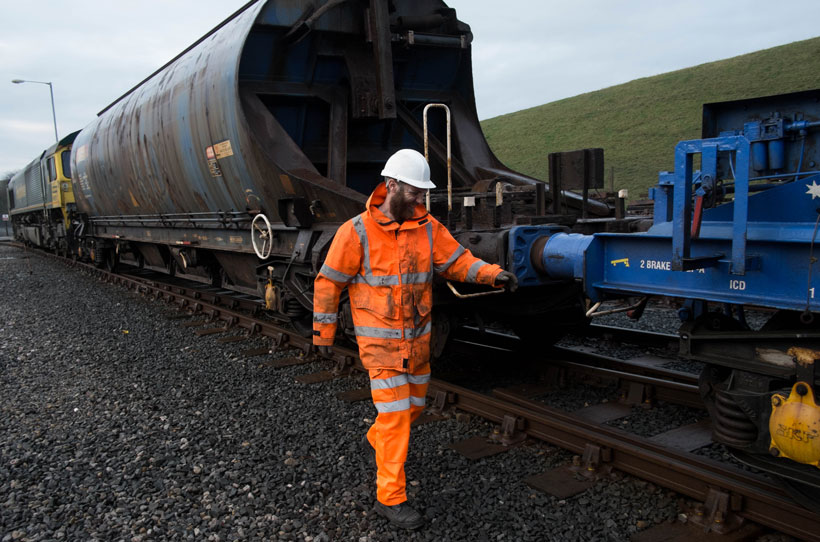
ICL’s Boulby mine in the United Kingdom is connected by a network of roads running over 11 kilometers southward from the mine entrance, as well as a network of underground roads extending 17.5 kilometers from the mine entrance in the direction of the North Sea. Approximately 80 kilometers of underground tunnels remain open to support current production. The mine enjoys easy access to national road and train transportation routes.
Pursuant to agreements with the North Yorkshire National Parks Authority, the total transport movements by means of the network of roads from site to site are limited to a maximum of 150 thousand tonnes per year and a maximum of 66 road wagons per day (no road movements are allowed on Sundays or bank holidays).
Eight trains per day transport Polysulphate®, PotashpluS and rock‑salt to Teesdock. Most of the Polysulphate® output is used as a component in agricultural fertilizers, and volumes are exported by sea from the Teesdock seaport to customers in the UK and overseas.
Rock‑salt is transported by train to Teesdock and loaded onto ship or trucks to local UK authorities for de‑icing roads.
ICL Boulby leases and operates three principal storage and loading facilities: the Teesdock facility, which is located on the Tees River, and two additional storage facilities that are connected to the main rail line – Cobra and Ayrton Works in Middlesbrough.
China
The YPH JV includes the Haikou mine, several factories for production of various types of fertilizers located close to the Haikou mine, and two plants for production of downstream products – one located close to the Haikou mine and the fertilizers factory and the other situated near the Kunming airport.
Most of the transport of raw materials from the Haikou mine to the acid factories is executed via pipeline (slurry), whereas a small portion of the raw rock is transported by trucks.
Most of the output sold to the local market is transported from the fertilizers factory directly to customers in North China by train, as well as through marine shipment, mainly from two ports (Beihai and Fangchengang). These ports are also used for import of sulphur. A small portion of the output sold is transported to customers in the Yunnan region.
